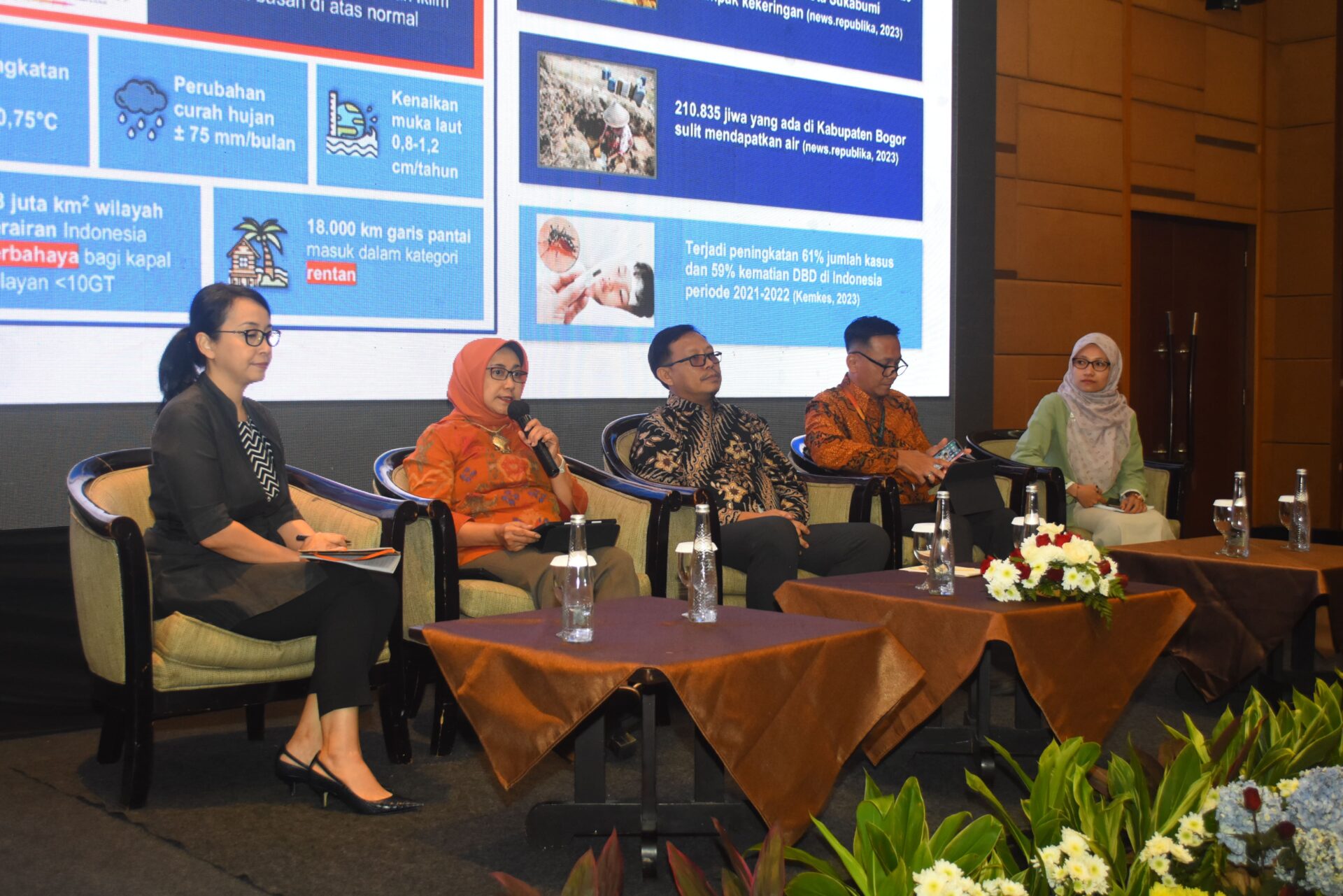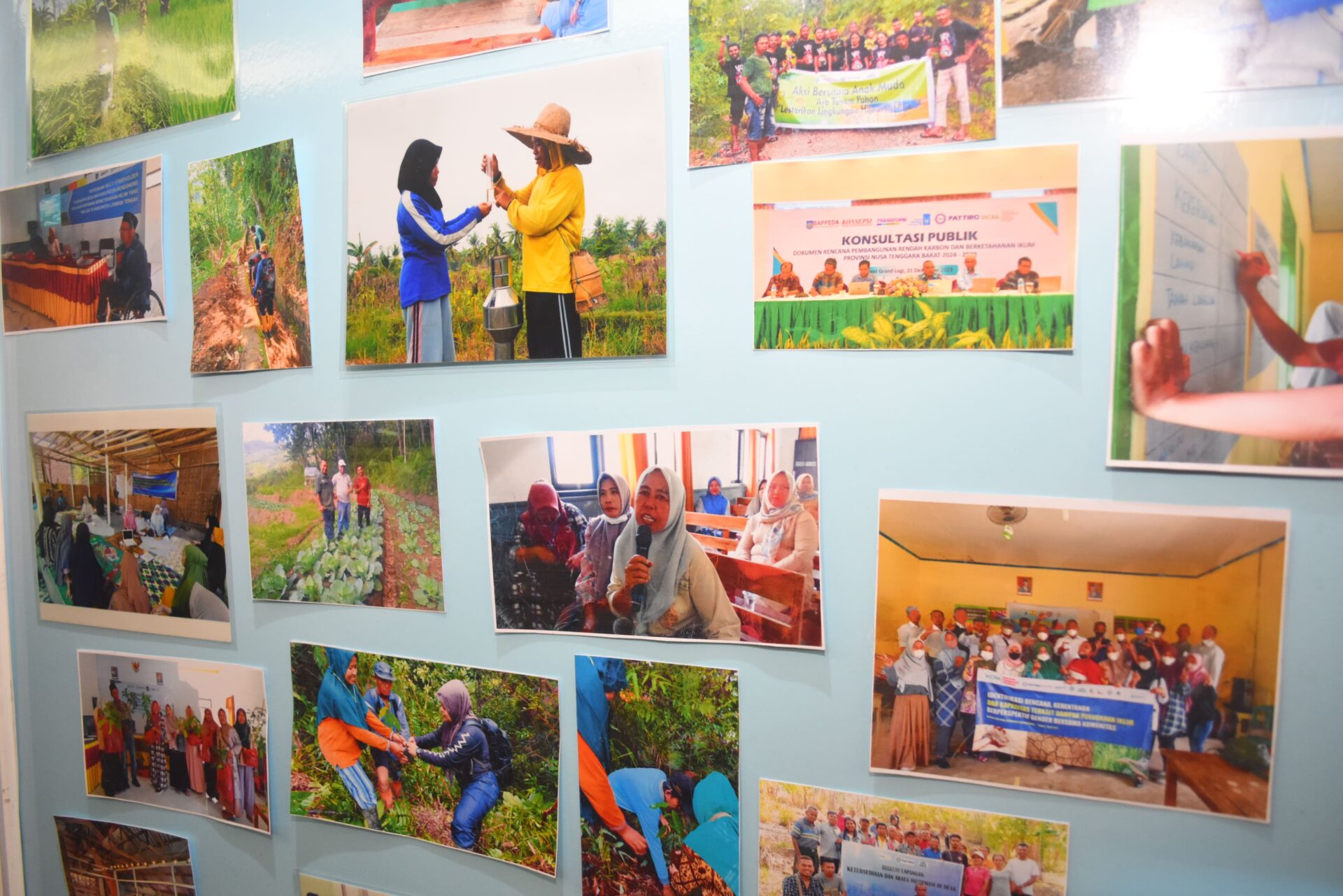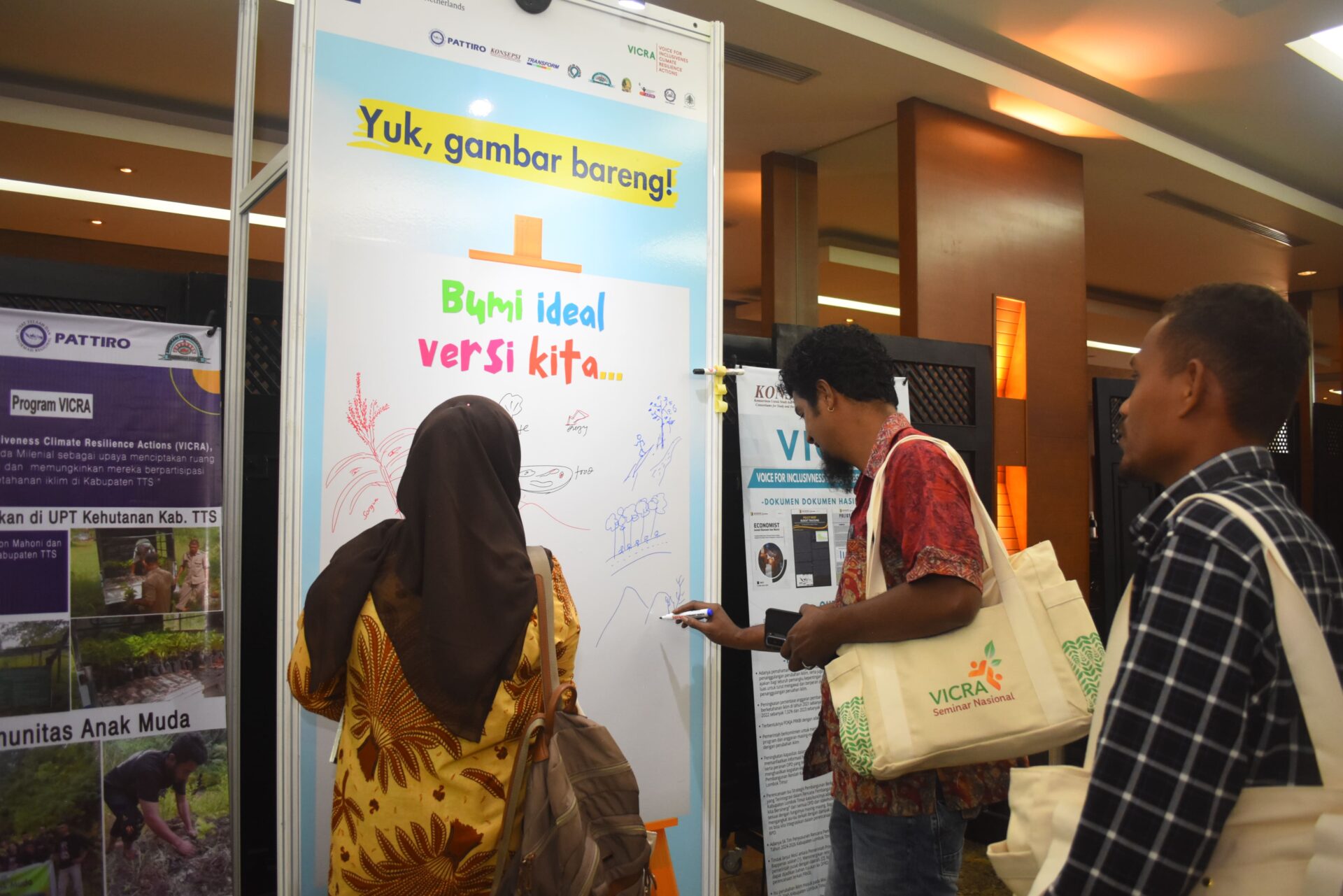Jakarta, Augsts 13, 2024– Climate change is forcing us to listen, embrace, and act together in the face of challenges. In this effort, the VICRA Program, supported by the Dutch Embassy in Indonesia, has shown that the collaboration of various parties is able to turn challenges into opportunities.
After a meaningful journey, the VICRA consortium consisting of 10 organizations, including PATTIRO, Konsepsi, Transform, Ayo Indonesia, bengkel APPEK, YKWS, YPPS, LP2M, PKBI West Sumatra, and Mitra Bentala, proudly organized a national Seminar and closing Ceremony of the VICRA Program on Tuesday, August 13, 2024 in Jakarta. The event is part of a concerted effort to build inclusive climate resilience while celebrating the achievements that have been achieved, as well as inspiring further action to engage vulnerable groups in efforts to deal with climate change.
Also present at the event were Mark Hengtsman, First Secretary Political Affairs Netherlands Embassy in Indonesia; Vivi Yulaswati, deputy for Maritime Affairs and Natural Resources of the Ministry of National Planning and development (Bappenas); Irwan Dharmawan, Policy Analyst Associate expert at the Center for Climate Change Financing and Multilateral Fiscal Policy Agency (bkf) of the Ministry of Finance (Kemenkeu); Eko Novi Ariyanti Rahayu Damayanti, Asdep and Child Protection (kpppa); Bejo Untung, Pattiro Executive recruits; and Suci Kurnia Sari district coordinator of VICRA program from PKBI West Sumatera.
Climate change has a disproportionate impact on vulnerable groups of people, such as women, the disabled, the elderly, and youth, who often bear the brunt of disasters. In supporting these groups, VICRA contributes to inclusive climate action for a sustainable future through collaborative efforts.
During the 2021-2024 period, VICRA has achieved various important milestones, including opening up civic space for climate change adaptation actions, especially in the agricultural sector. This Program ensures that climate resilient development (KPBI) policies can be implemented at the regional level by involving vulnerable farmer groups, women, youth, disability, elderly, and other marginal groups. In addition, VICRA also encourages inclusive policies and increased budget allocations for climate resilient development in villages, districts and provinces in 9 districts spread across 4 provinces.
Vivi Yulaswati, deputy for Maritime Affairs and Natural Resources at the Ministry of PPN/Bappenas, revealed that in the direction of the national development policy of RPJPN 2025-2045, the Government of Indonesia encourages the implementation of Climate Smart Agriculture as a response to climate change adaptation in the agricultural sector. This is done through the modernization of agricultural technology and irrigation, the development of quality and competitiveness of local human resources (HR), as well as strengthening the Rice Intensification System (SRI).
“Climate Smart Agriculture encourages intensification through seeding, fertilizer improvement, farmer regeneration, smart agriculture, and farmer insurance as climate change adaptation innovations in the agricultural sector, ” said Vivi.
In line with this, Irwan Dharmawan, an associate expert policy analyst at the Center for Climate Change Financing and Multilateral policy of the Ministry of Finance’S bkf, explained that Indonesia is responding to the challenge of climate change with fiscal policies that involve the use of Budget instruments and encourage the mobilization of green funding from domestic and international sources.
“Funding support for climate action can come from within and outside the country. From within the country, funding is carried out through strengthening spending by ministries and institutions and transfers to the regions, while from abroad through international financial cooperation,” said Irwan.
Embracing Vulnerable Groups
Sduring the VICRA Program, the Civil Society Consortium has worked hard to increase capacity and collaboration by ensuring that vulnerable groups have access to the resources and knowledge necessary for effective climate action. This effort is done by facilitating collaboration between vulnerable communities, experts, organizations, and government agencies.
Eko Novi Ariyanti Rahayu Damayanti, Gender mainstreaming assistant for social and Cultural Affairs at KPPPA, emphasized the importance of affirmations for vulnerable groups so that they have access to learning relevant skills and technologies, so that they can play an active role in climate resilience actions.
“This can be realized through the opening of green job opportunities for women and involving children’s forums in climate action,” said Eko.
The VICRA Program also provides support to grassroots initiatives to structure and implement climate action in accordance with the local context. One example in West Sumatra is the Women Farmers climate School (SIPP) Initiative initiated by PKBI West Sumatra. In addition, there is the involvement of vulnerable groups and evidence-based advocacy that increases the attention of parties to climate action.
Suci Kurnia Sari, VICRA Program District Coordinator of PKBI West Sumatera explained that the combination of involving vulnerable groups and evidence-based advocacy can increase the leverage of parties ‘ concern for Climate Resilience action. In addition, it is also important to build alliances with various parties to continue to echo the issue of climate change in the region.
In addition to West Sumatra, the VICRA Program contributes to advocating and facilitating that climate change issues become one of the priorities, among others, in 1) MoU between Bappenas and the NTB provincial government No. NK 07/M PPN/08/2023 and 415.4/21/Pem and OTDA/VIII/2023, 2) RPD of NTB province in 2024-2026, 3) RPD of Lampung Province in 2025-2026, 4) RPJPD in 2025-2045 and RPJMD in 2024 of West Sumatra Province, 5) Rpjpd and Rpjmd of Pesawaran Regency, 6) PERNA (village regulation) on agriculture and protection of clean water sources is still under discussion and planning with the involvement of the village government, the consultative body (BAMUS), and community leaders, 7) Regent Decree Number B.290/17-SK-2-22 on the establishment of Gender responsive Working Group on Climate Change Adaptation in East Lampung Province, 8) Low Carbon and resilient development policy document with climate resilience 2024-2045 in NTB province, 9) inclusive API Roadmap of East Lampung Regency, and others.
Optimism Looks at Sustainability
Bejo Untung, Executive Director of PATTIRO, is optimistic that the initiatives that have been built by the VICRA consortium will continue even though the official program has ended. In carrying out this program, VICRA’s consortium of civil society groups has stood firm on the principles of evidence-based policy advocacy, capacity building for vulnerable groups, and cross-sector collaboration.
“Strengthening policies at the district level that are evidence-based and involve affected groups, especially vulnerable groups, can encourage sustainable climate resilience actions,” concluded Bejo.







